Burt A. The Evolution of the British Empire and Commonwealth From the American Revolution
Подождите немного. Документ загружается.

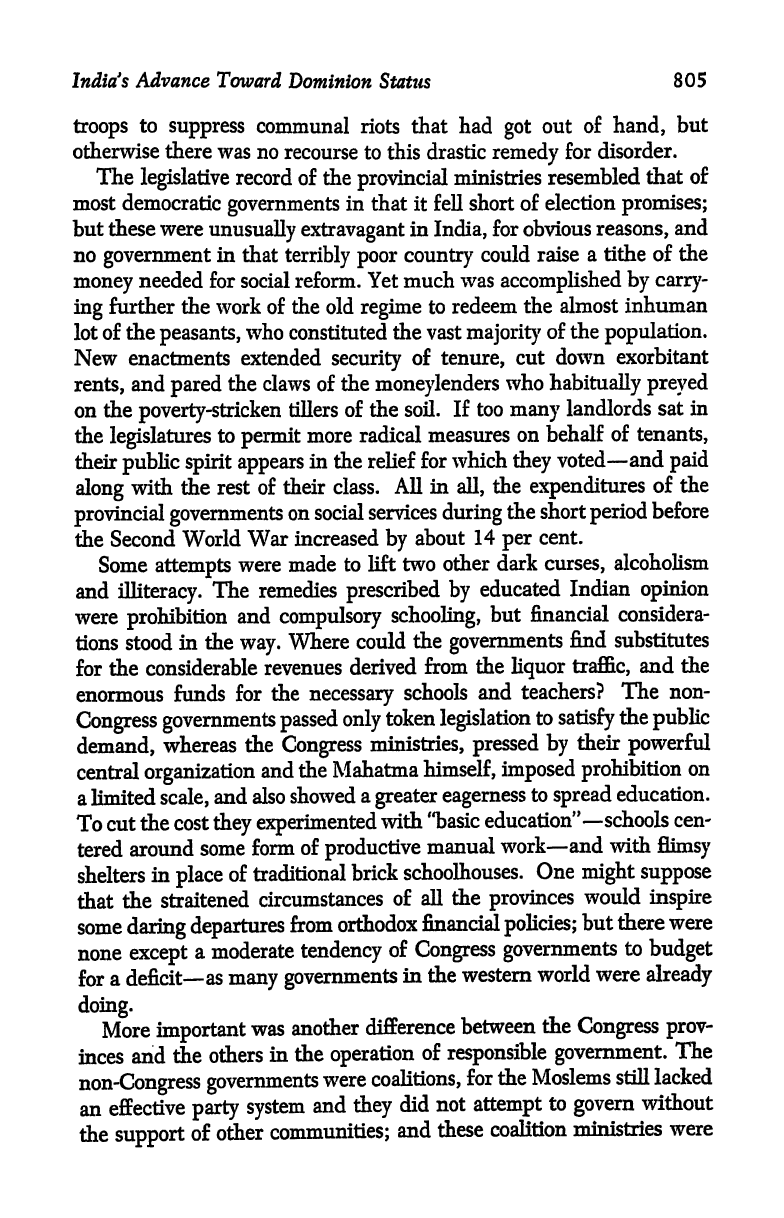
India's
Advance
Toward
Dominion Status
805
troops
to
suppress
communal
riots
that
had
got
out
of
hand,
but
otherwise
there
was
no
recourse to this drastic
remedy
for
disorder.
The
legislative
record
of
the
provincial
ministries
resembled
that of
most democratic
governments
in that
it
fell
short of
election
promises;
but
these were
unusually
extravagant
in
India,
for obvious
reasons,
and
no
government
in
that
terribly poor
country
could
raise
a tithe of
the
money
needed
for
social reform. Yet
much was
accomplished
by
carry-
ing
further
the
work
of
the
old
regime
to
redeem
the almost
inhuman
lot
of
the
peasants,
who constituted
the vast
majority
of
the
population.
New
enactments
extended
security
of
tenure,
cut down
exorbitant
rents,
and
pared
the claws
of
the
moneylenders
who
habitually
preyed
on
the
poverty-stricken
tillers of
the soil. If
too
many
landlords
sat
in
the
legislatures
to
permit
more
radical
measures
on behalf
of
tenants,
their
public
spirit
appears
in
the
relief
for
which
they
voted
and
paid
along
with the
rest of
their class.
All
in
all,
the
expenditures
of
the
provincial governments
on
social
services
during
the
short
period
before
the Second World
War
increased
by
about
14
per
cent.
Some
attempts
were made
to lift
two other
dark
curses,
alcoholism
and
illiteracy.
The remedies
prescribed
by
educated
Indian
opinion
were
prohibition
and
compulsory
schooling,
but
financial considera-
tions
stood
in
the
way.
Where
could
the
governments
find substitutes
for
the
considerable
revenues
derived
from
the
liquor
traffic,
and
the
enormous
funds
for
the
necessary
schools
and
teachers?
The
non-
Congress
governments
passed
only
token
legislation
to
satisfy
the
public
demand,
whereas
the
Congress
ministries,
pressed
by
their
powerful
central
organization
and
the
Mahatma
himself,
imposed prohibition
on
a limited
scale,
and also
showed
a
greater
eagerness
to
spread
education.
To
cut
the
cost
they experimented
with "basic
education"
schools
cen-
tered
around
some
form
of
productive
manual
work
and
with
flimsy
shelters
in
place
of
traditional
brick
schoolhouses.
One
might
suppose
that
the
straitened
circumstances
of all
the
provinces
would
inspire
some
daring
departures
from
orthodox
financial
policies;
but
there
were
none
except
a
moderate
tendency
of
Congress governments
to
budget
for
a
deficit
as
many
governments
in
the
western world
were
already
doing.
More
important
was
another
difference
between
the
Congress
prov-
inces
and
the
others
in
the
operation
of
responsible
government.
The
non-Congress
governments
were
coalitions,
for
the
Moslems
still lacked
an
effective
party
system
and
they
did
not
attempt
to
govern
without
the
support
of
other
communities;
and
these
coalition
ministries
were
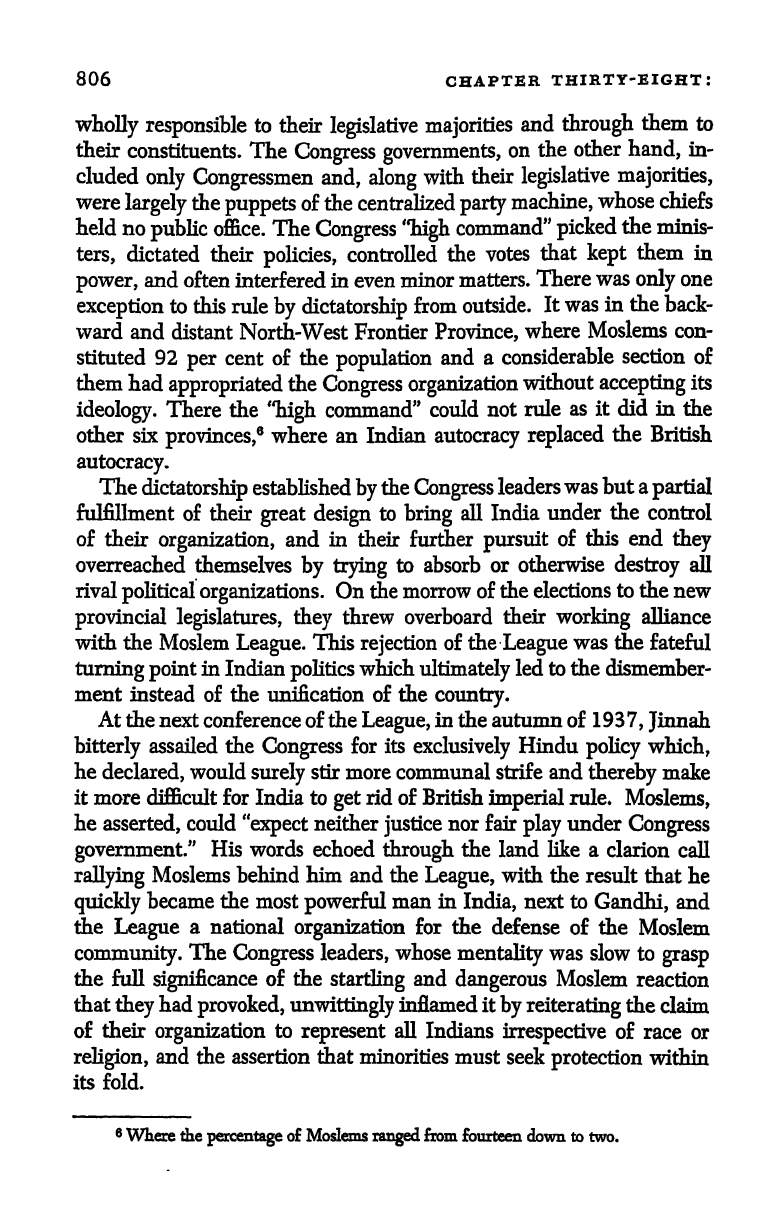
806
CHAPTER
THIRTY-EIGHT:
wholly
responsible
to
their
legislative
majorities
and
through
them
to
their
constituents. The
Congress governments,
on
the
other
hand,
in-
cluded
only
Congressmen
and,
along
with
their
legislative
majorities,
were
largely
the
puppets
of
the centralized
party
machine,
whose
chiefs
held
no
public
office. The
Congress
"high
command"
picked
the
minis-
ters,
dictated their
policies,
controlled
the
votes
that
kept
them
in
power,
and
often
interfered
in even
minor
matters.
There
was
only
one
exception
to this rule
by dictatorship
from
outside.
It
was
in the
back-
ward
and distant
North-West Frontier
Province,
where
Moslems con-
stituted 92
per
cent
of
the
population
and
a considerable
section
of
them
had
appropriated
the
Congress organization
without
accepting
its
ideology.
There the
"high
command"
could
not
rule
as
it
did
in
the
other six
provinces,
6
where
an
Indian
autocracy replaced
the
British
autocracy.
The
dictatorship
established
by
the
Congress
leaders
was
but
a
partial
fulfillment
of
their
great
design
to
bring
all India
under
the
control
of
their
organization,
and
in
their further
pursuit
of
this
end
they
overreached
themselves
by
trying
to absorb
or
otherwise
destroy
aU
rival
political
organizations.
On the
morrow of
the elections
to the
new
provincial
legislatures,
they
threw overboard
their
working
alliance
with
the Moslem
League.
This
rejection
of
the
League
was the
fateful
turning
point
in
Indian
politics
which
ultimately
led to
the
dismember-
ment
instead of the unification of the
country.
At the next
conference of the
League,
in
the autumn of
1937,
Jinnah
bitterly
assailed the
Congress
for its
exclusively
Hindu
policy
which,
he
declared,
would
surely
stir more
communal
strife and
thereby
make
it more
difficult
for
India to
get
rid
of
British
imperial
rule*
Moslems,
he
asserted,
could
"expect
neither
justice
nor fair
play
under
Congress
government."
His
words echoed
through
the
land like
a
clarion
call
rallying
Moslems
behind
him
and the
League,
with
the result
that
he
quickly
became the most
powerful
man in
India,
next to
Gandhi,
and
tie
League
a
national
organization
for
the
defense
of
the
Moslem
community.
The
Congress
leaders,
whose
mentality
was
slow to
grasp
the full
significance
of
the
startling
and
dangerous
Moslem
reaction
that
they
had
provoked,
unwittingly
inflamed
it
by
reiterating
the
claim
of
their
organization
to
represent
all
Indians
irrespective
of
race or
religion,
and the assertion
that
minorities must
seek
protection
within
its
fold.
6
Where the
percentage
of Moslems
ranged
from
fourteen down
to two.
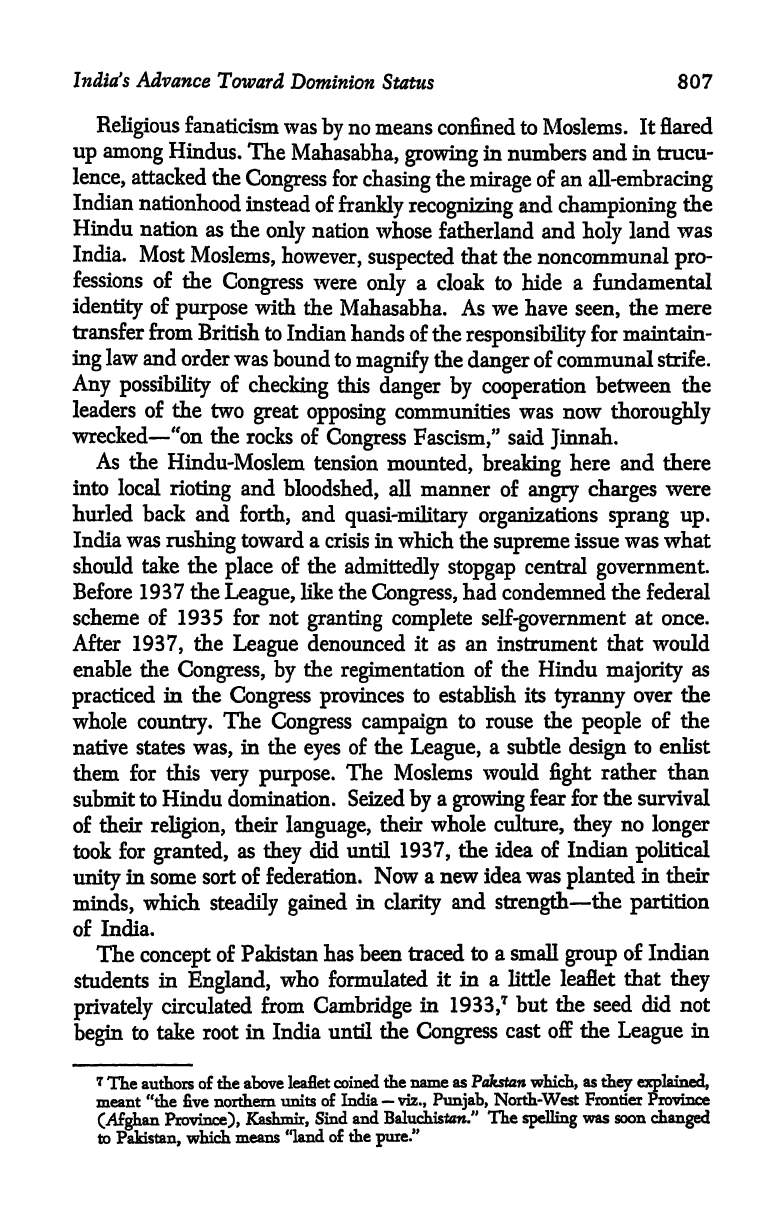
India's
Advance
Toward
Dominion Status
807
Religious
fanaticism
was
by
no
means
confined
to Moslems.
It
flared
up
among
Hindus.
The
Mahasabha,
growing
in numbers
and
in
trucu-
lence,
attacked the
Congress
for
chasing
the
mirage
of
an
all-embracing
Indian
nationhood
instead
of
frankly
recognizing
and
championing
the
Hindu
nation
as the
only
nation
whose
fatherland and
holy
land
was
India.
Most
Moslems,
however,
suspected
that the
noncommunal
pro-
fessions
of
the
Congress
were
only
a
cloak to hide
a
fundamental
identity
of
purpose
with
the
Mahasabha.
As
we
have
seen,
the mere
transfer
from
British to
Indian
hands
of
the
responsibility
for
maintain-
ing
law
and
order
was
bound
to
magnify
the
danger
of communal
strife.
Any
possibility
of
checking
this
danger
by cooperation
between
the
leaders of
the
two
great
opposing
communities was
now
thoroughly
wrecked
"on the
rocks
of
Congress
Fascism,"
said
Jinnah,
As
the
Hindu-Moslem
tension
mounted,
breaking
here and
there
into local
rioting
and
bloodshed,
all
manner
of
angry
charges
were
hurled back
and
forth,
and
quasi-military
organizations
sprang
up.
India
was
rushing
toward
a
crisis in
which the
supreme
issue
was what
should
take the
place
of the
admittedly
stopgap
central
government.
Before 1937 the
League,
like the
Congress,
had
condemned
the federal
scheme
of 1935 for
not
granting
complete
self-government
at
once.
After
1937,
the
League
denounced it as
an
instrument
that
would
enable the
Congress,
by
the
regimentation
of
the Hindu
majority
as
practiced
in
the
Congress provinces
to establish its
tyranny
over the
whole
country.
The
Congress
campaign
to rouse
the
people
of
the
native
states
was,
in the
eyes
of
the
League,
a
subtle
design
to
enlist
them for
this
very
purpose.
The Moslems
would
fight
rather
than
submit
to
Hindu domination.
Seized
by
a
growing
fear
for the survival
of
their
religion,
their
language,
their whole
culture,
they
no
longer
took
for
granted,
as
they
did
until
1937,
the
idea of
Indian
political
unity
in
some sort of
federation.
Now a new idea
was
planted
in their
minds,
which
steadily
gained
in
clarity
and
strength
the
partition
of
India.
The
concept
of
Pakistan
has
been
traced to
a small
group
of Indian
students
in
England,
who
formulated
it in a little
leaflet
that
they
privately
circulated
from
Cambridge
in
1933,
7
but
the seed did not
begin
to
take root
in India
until
the
Congress
cast
off
the
League
in
7
The
authors
of
the
above leaflet
coined
the
name
as
Pakstan
which,
as
they
explained,
meant
"the five northern
units
of
India
viz.,
Punjab,
North-West
Frontier Province
(Afghan
Province),
Kashmir,
Sind
and Baluchistan."
The
spelling
was soon
changed
to
Pakistan,
which
means
"land
of
the
pure."
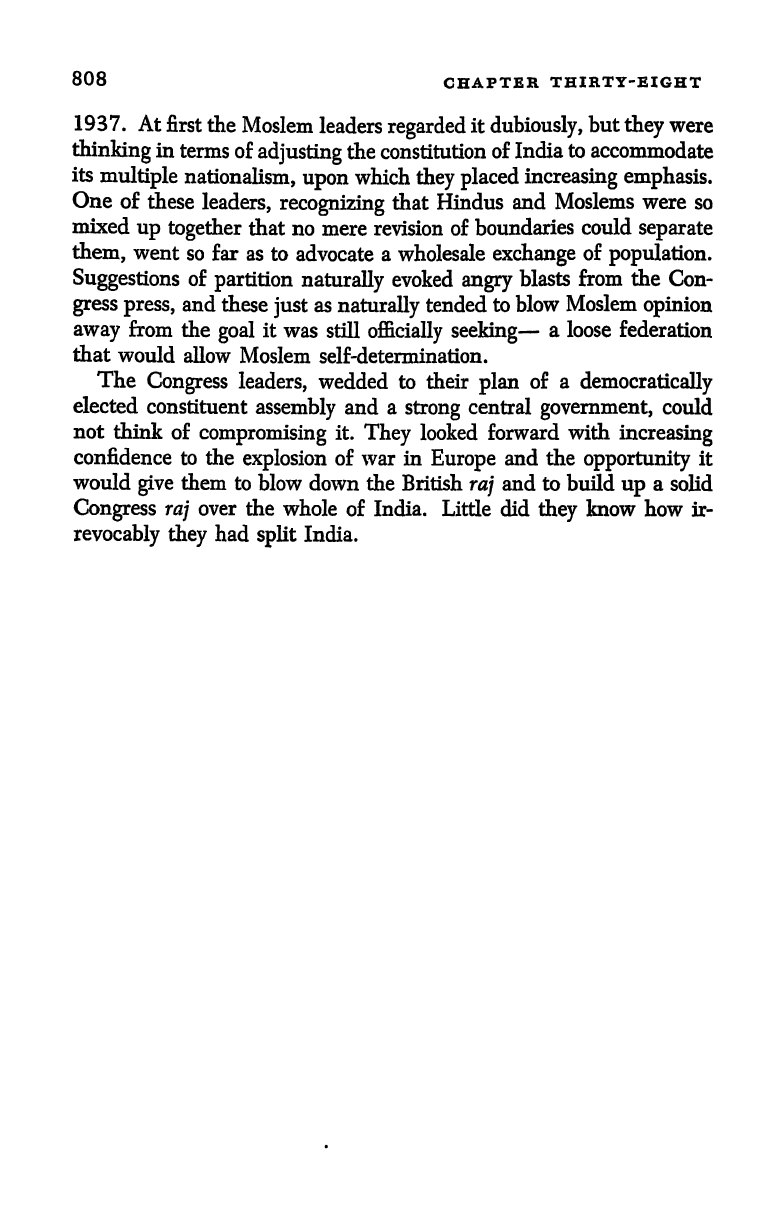
808
CHAPTER
THIRTY-EIGHT
1937.
At
first
the
Moslem
leaders
regarded
it
dubiously,
but
they
were
thinking
in
terms of
adjusting
the
constitution
of India
to
accommodate
its
multiple
nationalism,
upon
which
they placed
increasing
emphasis.
One
of
these
leaders,
recognizing
that
Hindus
and Moslems
were
so
mixed
up
together
that no
mere
revision of boundaries
could
separate
them,
went
so
far
as to
advocate
a
wholesale
exchange
of
population.
Suggestions
of
partition
naturally
evoked
angry
blasts from
the
Con-
gress
press,
and
these
just
as
naturally
tended
to
blow
Moslem
opinion
away
from
the
goal
it
was
still
officially seeking
a
loose
federation
that
would
allow
Moslem
self-determination.
The
Congress
leaders,
wedded
to their
plan
of
a
democratically
elected
constituent
assembly
and
a
strong
central
government,
could
not
think
of
compromising
it.
They
looked
forward
with
increasing
confidence
to
the
explosion
of war in
Europe
and the
opportunity
it
would
give
them
to
blow down the British
raj
and to build
up
a
solid
Congress
raj
over the
whole
of India. Little did
they
know
how ir-
revocably
they
had
split
India.
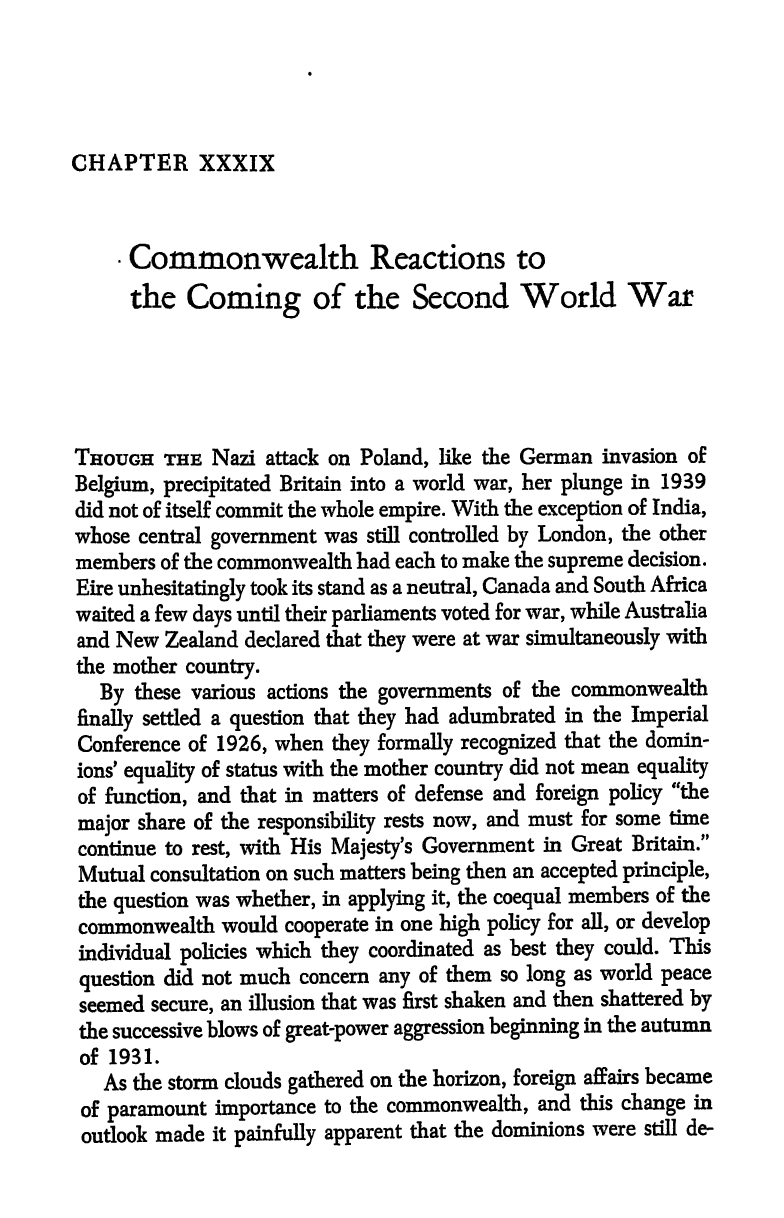
CHAPTER
XXXIX
Commonwealth Reactions
to
the
Coming
of
the Second
World
War
THOUGH THE
Nazi attack on
Poland,
like
the German
invasion
of
Belgium,
precipitated
Britain
into
a world
war,
her
plunge
in 1939
did not of
itself
commit
the
whole
empire.
With
the
exception
of
India,
whose
central
government
was still
controlled
by
London,
the other
members of
the
commonwealth
had
each
to
make
the
supreme
decision.
Eire
unhesitatingly
took
its stand
as
a
neutral,
Canada
and
South
Africa
waited
a few
days
until
their
parliaments
voted
for
war,
while
Australia
and
New Zealand declared
that
they
were
at
war
simultaneously
with
the
mother
country.
By
these
various
actions
the
governments
of
the commonwealth
finally
settled
a
question
that
they
had
adumbrated
in
the
Imperial
Conference
of
1926,
when
they
formally
recognized
that
the
domin-
ions'
equality
of
status
with
the
mother
country
did
not
mean
equality
of
function,
and
that
in
matters
of
defense
and
foreign
policy
"the
major
share
of
the
responsibility
rests
now,
and
must
for
some
time
continue
to
rest,
with
His
Majesty's
Government
in Great
Britain."
Mutual
consultation
on
such
matters
being
then
an
accepted
principle,
the
question
was
whether,
in
applying
it,
the
coequal
members
of the
commonwealth
would
cooperate
in one
high
policy
for
all,
or
develop
individual
policies
which
they
coordinated
as
best
they
could.
This
question
did
not
much
concern
any
of
them
so
long
as
world
peace
seemed
secure,
an
illusion
that
was
first
shaken
and
then
shattered
by
the
successive
blows
of
great-power
aggression
beginning
in
the
autumn
of
1931.
As
the
storm
clouds
gathered
on
the
horizon,
foreign
affairs
became
of
paramount
importance
to
the
commonwealth,
and
this
change
in
outlook
made
it
painfully
apparent
that
the
dominions
were still de-
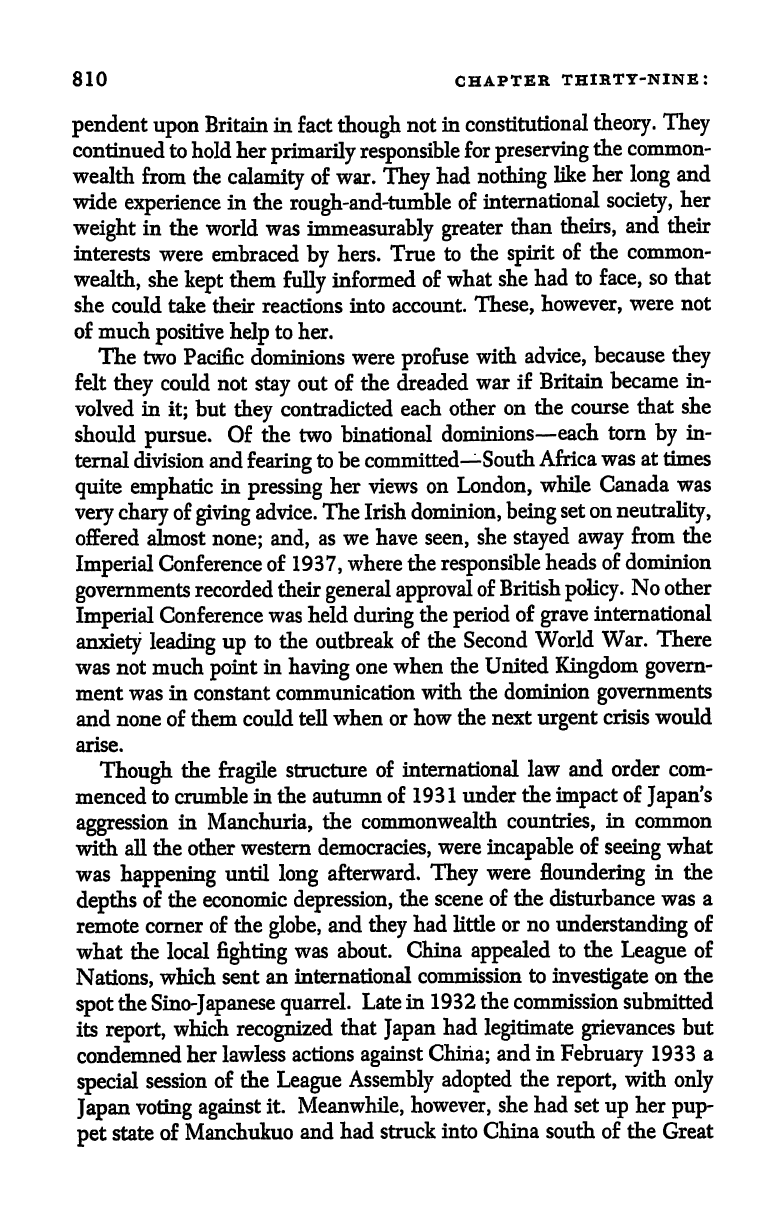
810
CHAPTER
THIRTY-NINE:
pendent
upon
Britain
in
fact
though
not
in
constitutional
theory.
They
continued
to
hold
her
primarily
responsible
for
preserving
the common-
wealth
from
the
calamity
of
war.
They
had
nothing
like
her
long
and
wide
experience
in the
rough-and-tumble
of
international
society,
her
weight
in
the
world
was
immeasurably
greater
than
theirs,
and
their
interests
were
embraced
by
hers.
True to
the
spirit
of
the
common-
wealth,
she
kept
them
fully
informed
of
what
she
had
to
face,
so that
she
could take their
reactions
into
account.
These,
however,
were not
of
much
positive help
to
her.
The
two
Pacific dominions
were
profuse
with
advice,
because
they
felt
they
could
not
stay
out
of
the
dreaded
war
if
Britain
became
in-
volved
in
it;
but
they
contradicted
each
other
on
the
course
that she
should
pursue.
Of
the two
binational
dominions
each torn
by
in-
ternal division
and
fearing
to
be committed
South
Africa
was
at
times
quite
emphatic
in
pressing
her views on
London,
while
Canada
was
very
chary
of
giving
advice.
The Irish
dominion,
being
set on
neutrality,
offered almost
none;
and,
as
we have
seen,
she
stayed
away
from
the
Imperial
Conference of
1937,
where
the
responsible
heads
of
dominion
governments
recorded their
general
approval
of
British
policy.
No
other
Imperial
Conference was
held
during
the
period
of
grave
international
anxiety
leading up
to
the
outbreak
of
the
Second
World
War.
There
was
not
much
point
in
having
one
when the
United
Kingdom
govern-
ment
was in
constant
communication
with
the
dominion
governments
and none of them
could
tell
when or
how
the
next
urgent
crisis
would
arise.
Though
the
fragile
structure
of
international
law
and order
com-
menced
to
crumble
in
the autumn
of
193 1
under
the
impact
of
Japan's
aggression
in
Manchuria,
the
commonwealth
countries,
in
common
with all
the
other
western
democracies,
were
incapable
of
seeing
what
was
happening
until
long
afterward.
They
were
floundering
in
the
depths
of
the economic
depression,
the
scene
of
the disturbance
was
a
remote
corner
of
the
globe,
and
they
had
little
or no
understanding
of
what the local
fighting
was about. China
appealed
to the
League
of
Nations,
which
sent
an
international
commission to
investigate
on
the
spot
the
Sino-Japanese
quarrel.
Late
in
1932
the
commission
submitted
its
report,
which
recognized
that
Japan
had
legitimate grievances
but
condemned
her
lawless
actions
against
China;
and
in
February
1933
a
special
session
of
the
League
Assembly
adopted
the
report,
with
only
Japan
voting
against
it.
Meanwhile,
however,
she had set
up
her
pup-
pet
state
of
Manchukuo
and
had
struck
into China south of the
Great
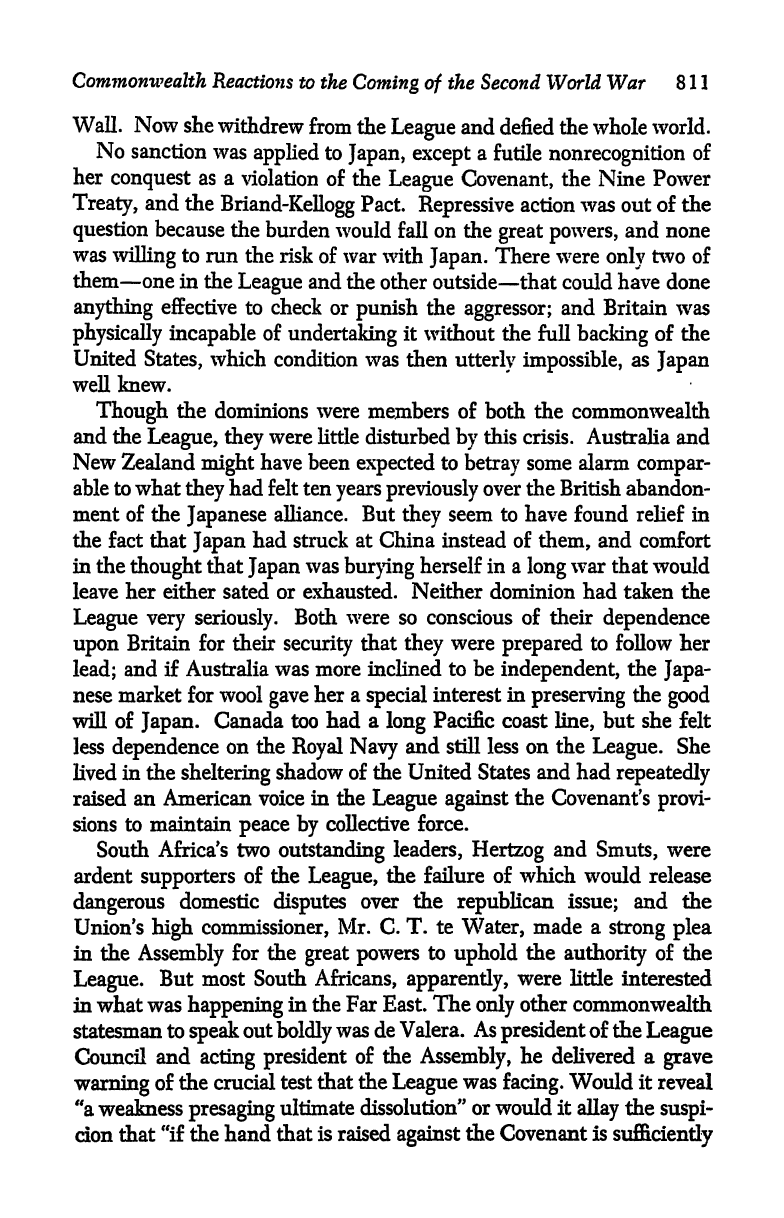
Commonwealth
Reactions
to
the
Coming
of
the Second
World War 811
Wall. Now she
withdrew
from the
League
and
defied
the
whole
world.
No
sanction
was
applied
to
Japan, except
a
futile
nonrecognition
of
her
conquest
as a
violation of the
League
Covenant,
the
Nine Power
Treaty,
and
the
Briand-Kellogg
Pact.
Repressive
action
was out
of
the
question
because
the
burden
would
fall
on the
great powers,
and
none
was
willing
to
run the
risk
of
war
with
Japan.
There
were
only
two
of
them
one
in
the
League
and
the
other
outside
that
could
have done
anything
effective to
check
or
punish
the
aggressor;
and Britain was
physically
incapable
of
undertaking
it
without the full
backing
of the
United
States,
which
condition was then
utterly
impossible,
as
Japan
well
knew.
Though
the
dominions were
members
of
both
the
commonwealth
and the
League, they
were little
disturbed
by
this crisis. Australia and
New
Zealand
might
have
been
expected
to
betray
some alarm
compar-
able
to
what
they
had
felt
ten
years
previously
over the British abandon-
ment
of the
Japanese
alliance.
But
they
seem
to
have
found relief in
the
fact
that
Japan
had
struck
at China
instead of
them,
and comfort
in
the
thought
that
Japan
was
burying
herself
in a
long
war
that
would
leave her
either
sated
or exhausted. Neither
dominion had taken the
League very
seriously.
Both were so
conscious
of their
dependence
upon
Britain
for
their
security
that
they
were
prepared
to follow her
lead;
and if
Australia
was
more inclined
to be
independent,
the
Japa-
nese
market
for wool
gave
her
a
special
interest
in
preserving
the
good
will of
Japan.
Canada
too had
a
long
Pacific coast
line,
but
she
felt
less
dependence
on the
Royal
Navy
and
still less on
the
League.
She
lived
in the
sheltering
shadow
of the United
States
and had
repeatedly
raised
an
American voice
in
the
League
against
the
Covenant's
provi-
sions to
maintain
peace by
collective
force.
South Africa's
two
outstanding
leaders,
Hertzog
and
Smuts,
were
ardent
supporters
of the
League,
the failure of which
would release
dangerous
domestic
disputes
over the
republican
issue;
and
the
Union's
high
commissioner,
Mr.
C.
T. te
Water,
made
a
strong plea
in
the
Assembly
for
the
great
powers
to
uphold
the
authority
of the
League.
But most South
Africans,
apparently,
were
little
interested
in what
was
happening
in the
Far
East.
The
only
other
commonwealth
statesman
to
speak
out
boldly
was de Valera.
As
president
of the
League
Council
and
acting
president
of
the
Assembly,
he
delivered
a
grave
warning
of
the
crucial
test
that
the
League
was
facing.
Would it
reveal
"a weakness
presaging
ultimate
dissolution"
or would it
allay
the
suspi-
cion
that
"if the hand
that
is
raised
against
the
Covenant
is
sufficiently
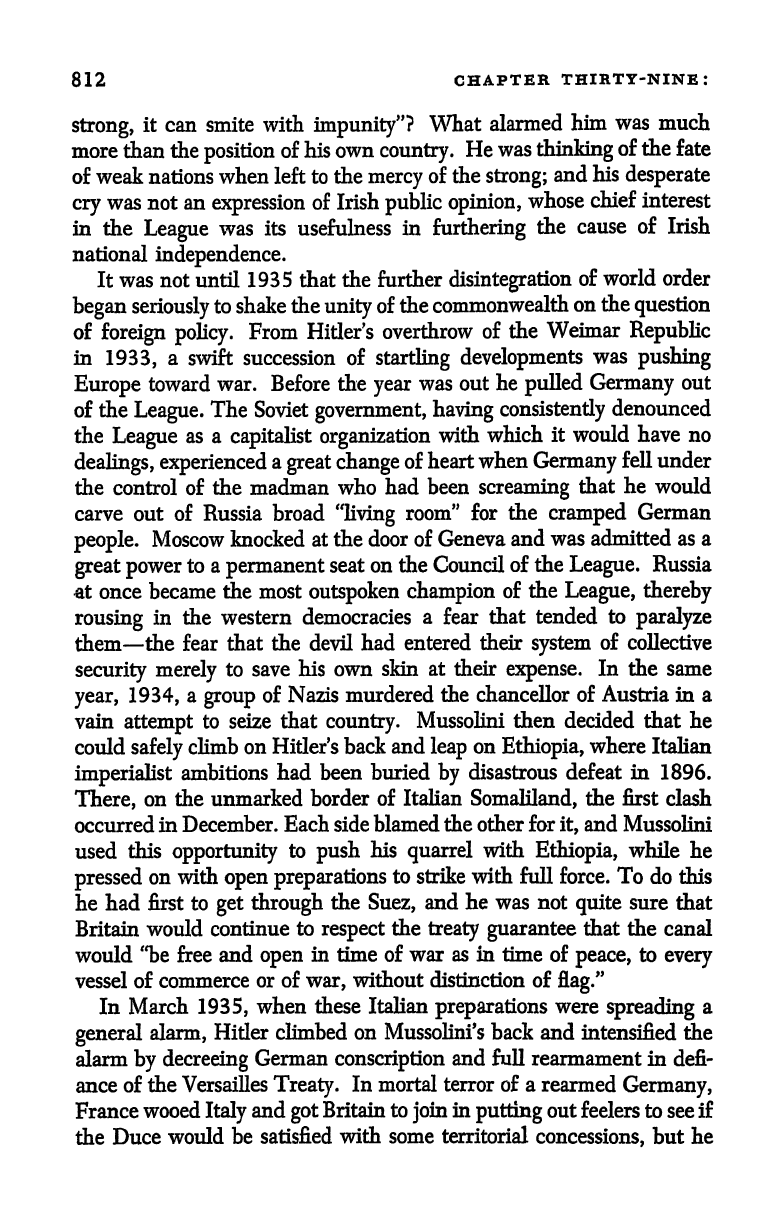
812
CHAPTER
THIRTY-NINE:
strong,
it can smite
with
impunity"?
What
alarmed
him
was
much
more
than
the
position
of
his
own
country.
He
was
thinking
of the
fate
of
weak nations
when
left to
the
mercy
of the
strong;
and
his
desperate
cry
was
not
an
expression
of
Irish
public
opinion,
whose
chief
interest
in the
League
was its usefulness
in
furthering
the
cause
of
Irish
national
independence.
It
was not until
1935 that
the further
disintegration
of
world
order
began
seriously
to
shake
the
unity
of
the commonwealth
on
the
question
of
foreign
policy.
From Hitler's
overthrow
of
the
Weimar
Republic
in
1933,
a
swift succession
of
startling
developments
was
pushing
Europe
toward
war.
Before
the
year
was out
he
pulled
Germany
out
of the
League.
The Soviet
government,
having
consistently
denounced
the
League
as a
capitalist
organization
with
which
it would have
no
dealings,
experienced
a
great change
of
heart when
Germany
fell
under
the control of
the madman who
had
been
screaming
that
he
would
carve
out
of Russia broad
"living
room" for
the
cramped
German
people.
Moscow
knocked
at the
door
of
Geneva
and
was admitted
as a
great
power
to
a
permanent
seat on
the
Council
of
the
League.
Russia
at once
became
the most
outspoken champion
of
the
League,
thereby
rousing
in the western
democracies
a
fear
that tended
to
paralyze
them
the fear
that the
devil
had
entered their
system
of
collective
security
merely
to
save his
own
skin
at
their
expense.
In the same
year,
1934,
a
group
of
Nazis
murdered
the
chancellor
of Austria in a
vain
attempt
to seize
that
country.
Mussolini
then
decided that he
could
safely
climb
on Hitler's back
and
leap
on
Ethiopia,
where
Italian
imperialist
ambitions
had been
buried
by
disastrous defeat
in
1896.
There,
on
the unmarked border
of Italian
Somaliland,
the first
clash
occurred
in
December.
Each
side
blamed
the other for
it,
and
Mussolini
used
this
opportunity
to
push
his
quarrel
with
Ethiopia,
while
he
pressed
on
with
open preparations
to
strike
with
full force. To
do
this
he
had first to
get
through
the
Suez,
and he was not
quite
sure that
Britain
would continue
to
respect
the
treaty
guarantee
that
the canal
would "be
free
and
open
in time
of
war
as in
time
of
peace,
to
every
vessel of commerce
or of
war,
without
distinction of
flag."
In March
1935,
when
these Italian
preparations
were
spreading
a
general
alarm,
Hitler climbed on
Mussolini's back
and
intensified
the
alarm
by decreeing
German
conscription
and full
rearmament in
defi-
ance
of the
Versailles
Treaty.
In mortal
terror
of a
rearmed
Germany,
France
wooed
Italy
and
got
Britain
to
join
in
putting
out
feelers to see if
the
Duce
would
be satisfied
with some
territorial
concessions,
but
he
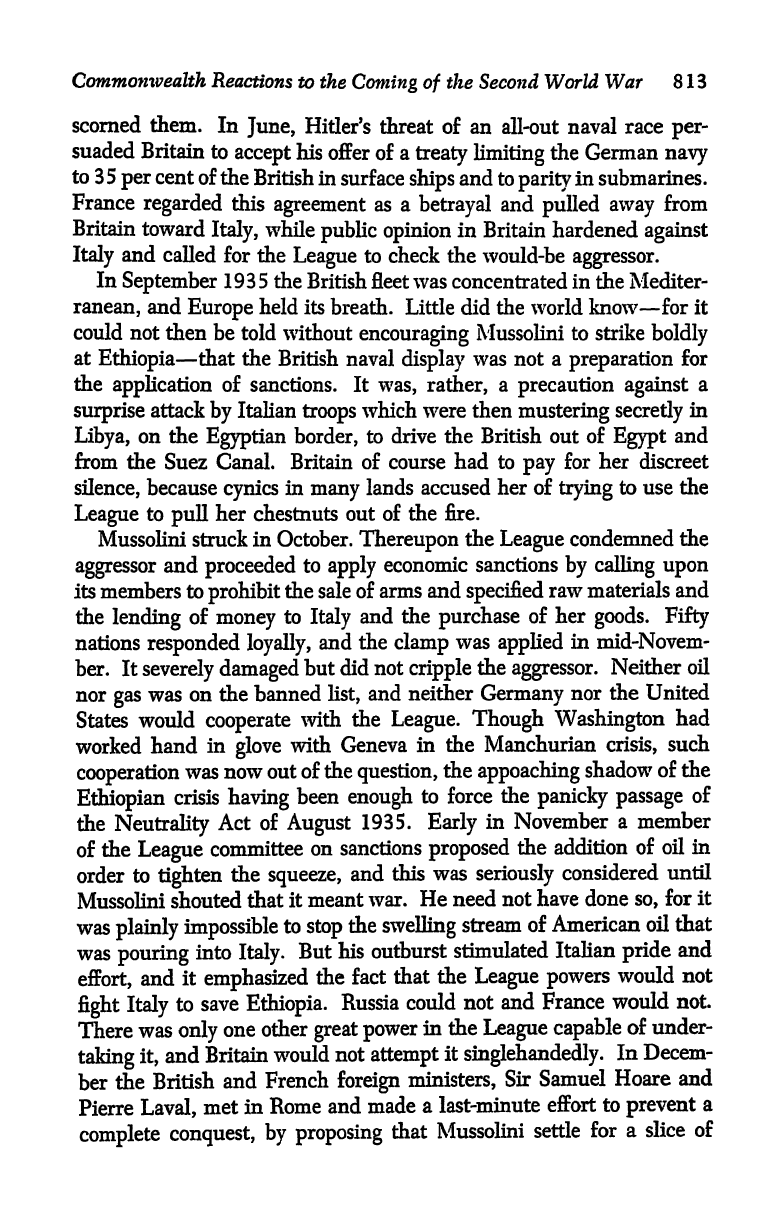
Commonwealth
Reactions
to
the
Coming
of
the Second World War
813
scorned
them.
In
June,
Hitler's threat of
an all-out naval
race
per-
suaded
Britain
to
accept
his offer
of
a
treaty
limiting
the German
navy
to
35
per
cent
of the
British in surface
ships
and
to
parity
in
submarines.
France
regarded
this
agreement
as
a
betrayal
and
pulled
away
from
Britain
toward
Italy,
while
public opinion
in Britain
hardened
against
Italy
and
called
for the
League
to check the
would-be
aggressor.
In
September
1935 the
British
fleet was
concentrated in the Mediter-
ranean,
and
Europe
held its
breath. Little did the world
know
for
it
could
not then be
told
without
encouraging
Mussolini
to
strike
boldly
at
Ethiopia
that
the
British
naval
display
was not a
preparation
for
the
application
of sanctions. It
was, rather,
a
precaution
against
a
surprise
attack
by
Italian
troops
which
were then
mustering
secretly
in
Libya,
on the
Egyptian
border,
to drive
the British
out
of
Egypt
and
from the
Suez
CanaL
Britain of course had to
pay
for
her
discreet
silence,
because
cynics
in
many
lands accused
her
of
trying
to use the
League
to
pull
her
chestnuts
out of
the fire.
Mussolini
struck in October.
Thereupon
the
League
condemned the
aggressor
and
proceeded
to
apply
economic
sanctions
by
calling
upon
its members
to
prohibit
the
sale
of
arms
and
specified
raw
materials
and
the
lending
of
money
to
Italy
and
the
purchase
of
her
goods.
Fifty
nations
responded
loyally,
and
the
clamp
was
applied
in mid-Novem-
ber. It
severely damaged
but
did
not
cripple
the
aggressor.
Neither oil
nor
gas
was
on the banned
list,
and
neither
Germany
nor
the United
States
would
cooperate
with the
League. Though
Washington
had
worked
hand
in
glove
with Geneva
in the
Manchurian
crisis,
such
cooperation
was
now
out
of the
question,
the
appoaching
shadow
of the
Ethiopian
crisis
having
been
enough
to force
the
panicky passage
of
the
Neutrality
Act of
August
1935.
Early
in November
a member
of
the
League
committee
on
sanctions
proposed
the
addition of
oil
in
order
to
tighten
the
squeeze,
and
this
was
seriously
considered
until
Mussolini
shouted
that
it
meant
war.
He need
not have done
so,
for
it
was
plainly
impossible
to
stop
the
swelling
stream
of
American
oil that
was
pouring
into
Italy.
But
his outburst
stimulated Italian
pride
and
effort,
and
it
emphasized
the
fact
that
the
League
powers
would
not
fight
Italy
to
save
Ethiopia.
Russia
could
not
and France
would
not.
There
was
only
one
other
great
power
in
the
League
capable
of
under-
taking
it,
and
Britain
would
not
attempt
it
singlehandedly.
In
Decem-
ber
the
British
and
French
foreign
ministers,
Sir
Samuel
Hoare
and
Pierre
Laval,
met
in
Rome
and
made
a last-minute
effort to
prevent
a
complete
conquest,
by
proposing
that
Mussolini
settle
for
a slice
of
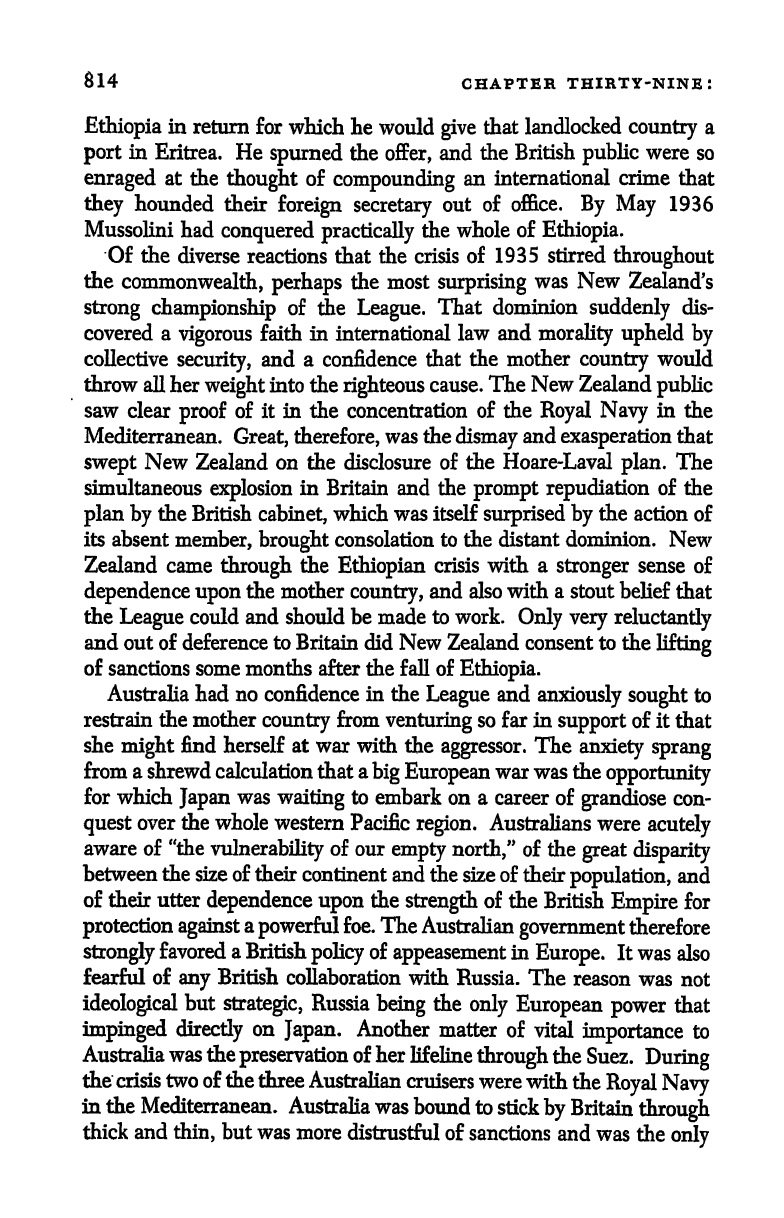
814
CHAPTER
THIRTY-NINE:
Ethiopia
in return
for
which he
would
give
that
landlocked
country
a
port
in
Eritrea.
He
spurned
the
offer,
and
the
British
public
were
so
enraged
at
the
thought
of
compounding
an
international
crime
that
they
hounded their
foreign secretary
out
of
office.
By
May
1936
Mussolini
had
conquered
practically
the
whole
of
Ethiopia.
Of the
diverse
reactions that
the
crisis
of
1935
stirred
throughout
the
commonwealth,
perhaps
the
most
surprising
was New
Zealand's
strong
championship
of
tie
League.
That dominion
suddenly
dis-
covered a
vigorous
faith
in international
law
and
morality upheld by
collective
security,
and
a
confidence
that
the
mother
country
would
throw
all her
weight
into
the
righteous
cause. The
New Zealand
public
saw
clear
proof
of it in the concentration
of
the
Royal Navy
in
the
Mediterranean.
Great,
therefore,
was the
dismay
and
exasperation
that
swept
New
Zealand
on the
disclosure
of
the Hoare-Laval
plan.
The
simultaneous
explosion
in Britain
and
the
prompt repudiation
of
the
plan
by
the British
cabinet,
which
was itself
surprised by
the
action
of
its absent
member,
brought
consolation
to the distant
dominion.
New
Zealand
came
through
the
Ethiopian
crisis with
a
stronger
sense
of
dependence
upon
the mother
country,
and also
with
a
stout
belief
that
the
League
could and should
be
made
to work.
Only
very
reluctantly
and
out of deference
to
Britain
did
New
Zealand consent to the
lifting
of
sanctions some
months after
the fall of
Ethiopia.
Australia had
no
confidence
in
the
League
and
anxiously
sought
to
restrain
the mother
country
from
venturing
so
far
in
support
of
it
that
she
might
find herself at war
with
the
aggressor.
The
anxiety
sprang
from
a
shrewd
calculation
that
a
big
European
war was the
opportunity
for
which
Japan
was
waiting
to
embark
on a career
of
grandiose
con-
quest
over
the
whole western
Pacific
region.
Australians
were
acutely
aware
of
"the
vulnerability
of our
empty
north,"
of the
great
disparity
between
the
size
of
their
continent
and
the
size of
their
population,
and
of their
utter
dependence upon
the
strength
of
the British
Empire
for
protection against
a
powerful
foe. The
Australian
government
therefore
strongly
favored
a
British
policy
of
appeasement
in
Europe.
It was
also
fearful of
any
British
collaboration with
Russia.
The
reason
was
not
ideological
but
strategic,
Russia
being
the
only
European
power
that
impinged
directly
on
Japan.
Another
matter
of
vital
importance
to
Australia
was
the
preservation
of
her
lifeline
through
the Suez.
During
the
crisis
two
of the three
Australian
cruisers were
with
the
Royal Navy
in
the Mediterranean.
Australia
was
bound
to
stick
by
Britain
through
thick
and
thin,
but was
more
distrustful of
sanctions
and
was
the
only
